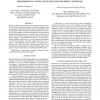Free Online Productivity Tools
i2Speak
i2Symbol
i2OCR
iTex2Img
iWeb2Print
iWeb2Shot
i2Type
iPdf2Split
iPdf2Merge
i2Bopomofo
i2Arabic
i2Style
i2Image
i2PDF
iLatex2Rtf
Sci2ools
114
click to vote
ICASSP
2010
IEEE
2010
IEEE
Discriminative template extraction for direct modeling
This paper addresses the problem of developing appropriate features for use in direct modeling approaches to speech recognition, such as those based on Maximum Entropy models or Segmental Conditional Random Fields. We propose a feature based on the detection of word-level templates which are discriminatively chosen based on a mutual information criterion. The templates for a word are derived directly from the MFCC feature vectors, based on self-similarity across examples. No pronunciation dictionary is used, and the resulting templates match closely to in-class examples and distantly to out-of-class examples. We utilize template detection events as input to a segmental CRF speech recognizer. We evaluate the entire scheme on a voice search task. The results show that the use of discriminative template based word detector streams improves the speech recognizer’s performance over the baseline HMM results.
Conditional Random Fields | CRF Speech Recognizer | ICASSP 2010 | Maximum Entropy Models | Signal Processing |
Related Content
| Added | 06 Dec 2010 |
| Updated | 06 Dec 2010 |
| Type | Conference |
| Year | 2010 |
| Where | ICASSP |
| Authors | Shankar Shivappa, Patrick Nguyen, Geoffrey Zweig |
Comments (0)

